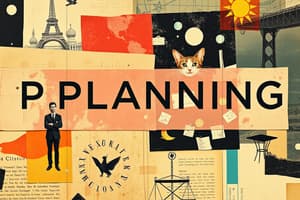Podcast
Questions and Answers
What is one of the key elements of planning mentioned in the text?
What is one of the key elements of planning mentioned in the text?
- Being spontaneous and random
- Ignoring all obstacles that arise
- Avoiding any form of structure
- Breaking complex activities into smaller components (correct)
What is the main focus of planning according to the text?
What is the main focus of planning according to the text?
- Being unprepared for future events
- Proactively determining objectives (correct)
- Reactive decision-making
- Organizing tasks randomly
Why is adaptability considered crucial in planning?
Why is adaptability considered crucial in planning?
- To deal with each activity individually
- To maintain focus and prevent oversights
- To stick rigidly to the original plan
- To respond swiftly to unexpected changes (correct)
How does a goal-oriented approach contribute to effective planning?
How does a goal-oriented approach contribute to effective planning?
How does planning differ from just reacting to situations?
How does planning differ from just reacting to situations?
Why is future-orientation considered a key element of planning?
Why is future-orientation considered a key element of planning?
Which characteristic helps maintain focus in planning?
Which characteristic helps maintain focus in planning?
Which term from the text best describes planning as being methodical and well-organized?
Which term from the text best describes planning as being methodical and well-organized?
Why is being future-oriented important in planning?
Why is being future-oriented important in planning?
How does being goal-oriented influence the planning process?
How does being goal-oriented influence the planning process?
Flashcards are hidden until you start studying
Study Notes
Planning can be defined as the process of thinking about what needs to happen in order to achieve something specific. It's all about setting goals and taking steps towards accomplishing them. Here we will explore planning from different angles, including its nature, structure, and how it relates to our goals, future, flexibility, and systematically working through tasks.
Planning is typically considered as being goal-oriented because we tend to plan with a purpose – that is, we have some end result, achievement, or objective that we want to accomplish by means of thoughtful preparation and organization. This means that rather than just reacting to situations, we proactively determine where we want to go and take calculated actions to reach those destinations. For instance, when you decide you need to buy groceries before you run out of food, you create a mental list of items needed, and organize your trip accordingly.
Future-orientation is also a key element of planning. When we plan, we essentially visualize ourselves progressing forward, anticipating events and interactions yet to occur. We don't only consider today; instead, we think beyond current time frames into the days ahead. In this sense, planning involves seeing tomorrow, next week, next month even years down the line, and making preparations that will benefit us once these times arrive.
Systematicity plays a big part too. A successful planner doesn't operate randomly but follows rules and structures designed to help ensure success. These may vary depending upon one's field or task, but they generally involve breaking complex activities into smaller components and dealing with each individually until a larger whole has been achieved. This methodical approach helps maintain focus while preventing oversights.
Finally, adaptability is crucial. Realizing plans rarely unfold perfectly according to scripted scenarios, the best laid plans often require adjustments along the way. Flexibility allows us to respond swiftly if things change direction midway through our journey. It ensures that obstacles won't derail us, but merely present challenges requiring creative solutions. Planners must remain open minded so their strategies stay effective despite unexpected circumstances arising during implementation.
In summary, planning combines elements such as goal orientation, future orientation, systematic processes, and flexibility. By using these aspects effectively, individuals can increase chances of achieving desired outcomes more efficiently, maintaining control over uncertainty both near term and longer term.
Studying That Suits You
Use AI to generate personalized quizzes and flashcards to suit your learning preferences.





